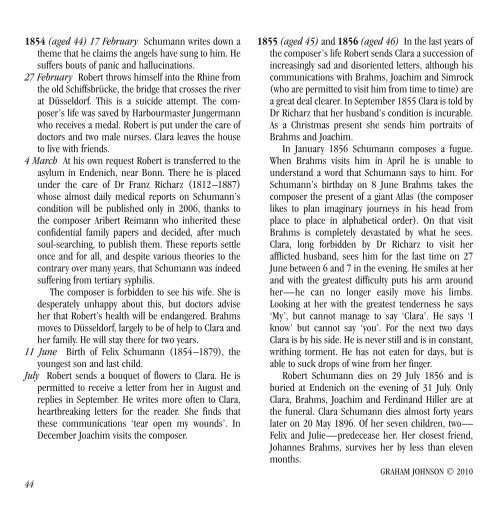Téléchargez le livret intégral en format PDF (application ... - Classique
Téléchargez le livret intégral en format PDF (application ... - Classique
Téléchargez le livret intégral en format PDF (application ... - Classique
Erfolgreiche ePaper selbst erstellen
Machen Sie aus Ihren PDF Publikationen ein blätterbares Flipbook mit unserer einzigartigen Google optimierten e-Paper Software.
1854 (aged 44) 17 February Schumann writes down a<br />
theme that he claims the angels have sung to him. He<br />
suffers bouts of panic and hallucinations.<br />
27 February Robert throws himself into the Rhine from<br />
the old Schiffsbrücke, the bridge that crosses the river<br />
at Düsseldorf. This is a suicide attempt. The composer’s<br />
life was saved by Harbourmaster Jungermann<br />
who receives a medal. Robert is put under the care of<br />
doctors and two ma<strong>le</strong> nurses. Clara <strong>le</strong>aves the house<br />
to live with fri<strong>en</strong>ds.<br />
4 March At his own request Robert is transferred to the<br />
asylum in End<strong>en</strong>ich, near Bonn. There he is placed<br />
under the care of Dr Franz Richarz (1812–1887)<br />
whose almost daily medical reports on Schumann’s<br />
condition will be published only in 2006, thanks to<br />
the composer Aribert Reimann who inherited these<br />
confid<strong>en</strong>tial family papers and decided, after much<br />
soul-searching, to publish them. These reports sett<strong>le</strong><br />
once and for all, and despite various theories to the<br />
contrary over many years, that Schumann was indeed<br />
suffering from tertiary syphilis.<br />
The composer is forbidd<strong>en</strong> to see his wife. She is<br />
desperately unhappy about this, but doctors advise<br />
her that Robert’s health will be <strong>en</strong>dangered. Brahms<br />
moves to Düsseldorf, largely to be of help to Clara and<br />
her family. He will stay there for two years.<br />
11 June Birth of Felix Schumann (1854–1879), the<br />
youngest son and last child.<br />
July Robert s<strong>en</strong>ds a bouquet of flowers to Clara. He is<br />
permitted to receive a <strong>le</strong>tter from her in August and<br />
replies in September. He writes more oft<strong>en</strong> to Clara,<br />
heartbreaking <strong>le</strong>tters for the reader. She finds that<br />
these communications ‘tear op<strong>en</strong> my wounds’. In<br />
December Joachim visits the composer.<br />
44<br />
1855 (aged 45) and 1856 (aged 46) In the last years of<br />
the composer’s life Robert s<strong>en</strong>ds Clara a succession of<br />
increasingly sad and disori<strong>en</strong>ted <strong>le</strong>tters, although his<br />
communications with Brahms, Joachim and Simrock<br />
(who are permitted to visit him from time to time) are<br />
a great deal c<strong>le</strong>arer. In September 1855 Clara is told by<br />
Dr Richarz that her husband’s condition is incurab<strong>le</strong>.<br />
As a Christmas pres<strong>en</strong>t she s<strong>en</strong>ds him portraits of<br />
Brahms and Joachim.<br />
In January 1856 Schumann composes a fugue.<br />
Wh<strong>en</strong> Brahms visits him in April he is unab<strong>le</strong> to<br />
understand a word that Schumann says to him. For<br />
Schumann’s birthday on 8 June Brahms takes the<br />
composer the pres<strong>en</strong>t of a giant Atlas (the composer<br />
likes to plan imaginary journeys in his head from<br />
place to place in alphabetical order). On that visit<br />
Brahms is comp<strong>le</strong>tely devastated by what he sees.<br />
Clara, long forbidd<strong>en</strong> by Dr Richarz to visit her<br />
afflicted husband, sees him for the last time on 27<br />
June betwe<strong>en</strong> 6 and 7 in the ev<strong>en</strong>ing. He smi<strong>le</strong>s at her<br />
and with the greatest difficulty puts his arm around<br />
her—he can no longer easily move his limbs.<br />
Looking at her with the greatest t<strong>en</strong>derness he says<br />
‘My’, but cannot manage to say ‘Clara’. He says ‘I<br />
know’ but cannot say ‘you’. For the next two days<br />
Clara is by his side. He is never still and is in constant,<br />
writhing torm<strong>en</strong>t. He has not eat<strong>en</strong> for days, but is<br />
ab<strong>le</strong> to suck drops of wine from her finger.<br />
Robert Schumann dies on 29 July 1856 and is<br />
buried at End<strong>en</strong>ich on the ev<strong>en</strong>ing of 31 July. Only<br />
Clara, Brahms, Joachim and Ferdinand Hil<strong>le</strong>r are at<br />
the funeral. Clara Schumann dies almost forty years<br />
later on 20 May 1896. Of her sev<strong>en</strong> childr<strong>en</strong>, two—<br />
Felix and Julie—predecease her. Her closest fri<strong>en</strong>d,<br />
Johannes Brahms, survives her by <strong>le</strong>ss than e<strong>le</strong>v<strong>en</strong><br />
months.<br />
GRAHAM JOHNSON © 2010



